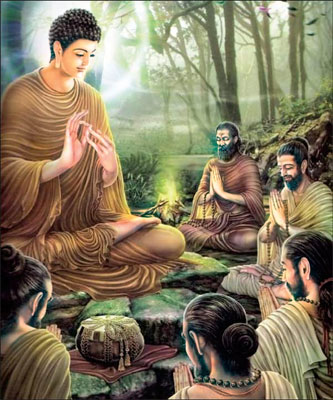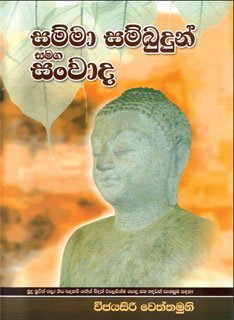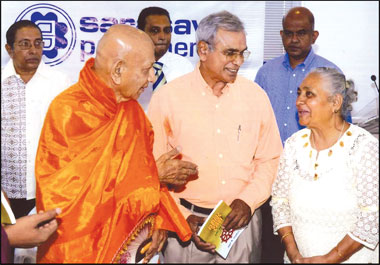|
Buddhist Spectrum
PEACE and LOVING KINDNESS in BUDDHISM
Premasara EPASINGHE
The Buddhist Teachings or its Philosophy are closely linked, imbued
with the Spirit of Peace. True peace in the world can be achieved when
every individual’s mind is at peace. A mind resonant with thoughts of
loving kindness is the safest guarantee for all beings to live happily.
To achieve this goal Metta – loving-kindness can be used as an object
of meditation. It will protect one against ill-will, anger and other
harmful mental behaviour patterns. Metta-loving-kindness radiates
benevolence towards all without discrimination, humans, non-humans,
known, unknown, visible, invisible. In Mettanussati, the second stanza:-
 Sukhi Bhaveyyam Niddukkho Sukhi Bhaveyyam Niddukkho
Aham Niccam Aham Viya
Hita ca me Sukhi Hontu
Majjhatta Tha ca Verino
May I be free from sorrow and always be happy. May those who desire
my welfare, those who are indifferent towards me and those who hate me
be happy.
Even to your enemy, show compassion and love.
Meditation is a key component of mind development.
The meditations are Asuba Bharana Aharapatikulasana Sabba Loka
Anabiratasanna, Sabba Loka Anabirata Sanna, Sabba Sanskaresu Annicci
Sanna and Marana Sanna, according to Satipattana sermon. Not only
Buddhists, all human beings should follow Metta (compassion), Karuna
(kindness), Mudita (joy in other prosperity), Upekka (equanimity).
Loving kindness is universal and all embracing. Therefore, Buddhists and
non-Buddhists alike can practise loving-kindness and experience good
results.
Once can extend the kindness and compassion as mentioned in the 5
stanzas in Mettanussati. Now, we will analyse and study stanzas No 4 and
5.
Samanta Cakka Valesu
Sattanam Tesu Panino
Sukkhino Puggala Bhuta
Atta Bhava Gata Siyum
(May all beings having in every world, each element of life, within
such system be happy and achieve the highest bliss).
Tatha Itthi Puma Ceva
Ariya Anariya Pi, Ca
Deva Nara Appayattha
Tatha Dasa Disasu Cat,
Like wise, women, men, the noble and the ignoble ones, gods, men and
those in woeful states and those living in the ten directions. May all
these beings be happy.
If one is a beginner in meditation, radiate metta to a very dear
friend, neutral person, an unpleasant - wicked person and last but not
the least to your enemy. A number of Buddha’s discourses draw out the
close mutual relationship between inner, personal, outer, social peace.
The people with peaceful mind will interact peacefully with others and
encourage others to do likewise. The crux of Buddha’s teachings on
peaceful and harmonious living was the guidance that Buddha gave on
morality.
Before commencing to meditate on metta, recollect the benefits of
loving kindness and danger of anger. Due to anger sudden temper people
kill each other and suffer in this world as well as in other places
after their deaths. Therefore, begin “Mettanusati’ by repeating the
following lines in the mind. Keep repeating these words, given below
until they sink into the “Monkey Mind”, which gradually becomes
concentrated happy and peaceful.
May I be free from harm and danger;
May I be free from mental suffering;
May I be free from physical suffering;
May I be well and happy!
Then, extend to others the happiness.
What are the good results, one will incur by practising meditation
regularly ?
A person who constantly meditate – Metta Bhavana sleeps, awakes
peacefully. Disturbing dreams will not occur. One will develop his
personality and character pleasing to others. He or she will be charming
and pleasant.
A person who meditates will be free from disturbances from Evil
spirits, ill-luck, ill-omens, Evil planetary influences, dangers, fear
and will not be affected by misfortune, from fire, poison and weapons.
Further, he may gain concentration quickly and he will die with a mind
free from confusion. A person who meditates may be a cultivator of
longevity, riches, glory, fame, strength, appearance and comfort.
Thathagatha Siddhartha Gautama Buddha described effective stories
relating to the cultivation of loving kindness, friendliness towards all
beings (Metta Bhavana). Once Buddha gave this simile.
Quote:
Dear Monks, if someone gives away hundred pots of food, in the
morning, afternoon, evening, and someone else were to develop a mind of
loving kindness even for the time it takes to pull a cow’s udder, either
in the morning, noon or evening, this would be more fruitful than the
former.
Therefore monks, you should train yourself thus – We will develop and
cultivate the liberation of mind by loving kindness, make in our
vehicle, make it our basis and fully perfect it.”
The Metta-Sutta, enlighten you with the cultivation and practice of
universal kindness. It is a must or essential for one who wants to know
the path of peace.
In the Dhammapada Classic of Asia, verse or stanza number 5 reads
thus:
Na Hi Verena Verani -
Sammantidha Kudacanam -
Averena ca Sammanti -
Esa Dhammo Sanantano
In this world, hatred never ceases by hatred;
It ceases by love alone; This is an Eternal Law).
Buddha urges us to overcome anger by non anger; overcome the wicked
by goodness. Overcome the Miser by generosity, overcome the liar by
truth.
I conclude this article on the value of universal kindness quoting,
verse No 7 and 8 from Karaniya Metta Sutta.
Mata – Yatha Niyam Puttam
Ayusa-Eka Putta-Manu Rakkhe
Evampi Sabba Bhutesu
Manasam – Bhavaye Apari – Manam
Just as a mother would protect her only child at the risk of her own
life, even so let him cultivate a boundless heart towards all beings.
Mettanca Sabba Lokasmin
Manasam Bhavaye Apari-Manam
Uddham Adho ca Tiriyanca
Asam – Badham Averam Asa-Pattam
Let thoughts of boundless love pervade the whole world, above, below
and across without any obstruction, without any hatred, without any
enmity.
May the Triple Gem bless you.
Collection of discourses of the Buddha
Title : Samman Sambudun
Samaga Sanwada,
Author : Wijayasiri Wettimuny Author Publication
I have gone through many books on Buddhism but only a few of them
made a lasting impression on my memory. Among them “The Buddha” by
Hermann Oldenberg, “What the Buddha Taught” by Dr. Walpola Rahula Thera
and “Buduhamuduruwo” by Ganehama Saranankara Thera come to the
forefront.
 Recently I went through ‘Samma Sambudun Samaga Sanvada’ by Buddhist
scholar, Wijayasiri Wettimuny. I have been very much impressed by the
comprehensive presentation of the Buddhist doctrine through the
conversations Buddha had with monks, Deities, Brahmins, princes, kings,
peasants and men from all walks of life. The equanimity of the Buddha is
unparalleled in world history. Recently I went through ‘Samma Sambudun Samaga Sanvada’ by Buddhist
scholar, Wijayasiri Wettimuny. I have been very much impressed by the
comprehensive presentation of the Buddhist doctrine through the
conversations Buddha had with monks, Deities, Brahmins, princes, kings,
peasants and men from all walks of life. The equanimity of the Buddha is
unparalleled in world history.
Buddha’s discussions had immense variety. Once he would talk about
subtle metaphysical points of the Dhamma such as human urges,
unconscious mind abstruse expositions on the mystery of birth and death
and the defilements that pollute the mind of man.
Next moment he would talk to a layman about successful management of
household life. With kings and princes he would talk about statecraft
and intricate political problems. He even had talked about music.
Whatever talk he had, he manipulated it to a moral end.
The talk the Budhha had about music is recorded in page 336 of
Wettimuny’s book explicitly and comprehensively.
Panchasika, the musician of Tavatinsa heaven, once visited the
Buddha, standing outside the abode of the Buddha, within a short
distance to be audible to the Buddha, Panchasika began to sing a lyric
describing the alluring beauty of his sweetheart while playing his
reputed lyre which was named as Beluvapanda. One of the lyrics he
recited was interesting. It goes as follows.
“When shall I be lucky
To feel the warmth of your bosom
Supple smooth and sensual”
The Pali lines that are quoted in the book run as follows.
“Tate tava Ogate tanudarang” and C.
After the singing was over Panchasika went before the Buddha. He did
not vituperate Panchasika for singing an obscene lyric. Instead Buddha
talked about the quality of his singing. He admired the harmony between
vocal singing and the instrumental music.
At the end of recording the conversation Wettimuny raises a pauser.
Is the Buddha the first music critic in the world? I very much agree
with this hypothesis. Moreover this dialogue provides a very good
rejoinder of those critics who opine that the Buddha had no regard for
the worldly aspects of life and his teachings are nihilistic.
Going through this book, one realises that apart from being a great
teacher, philosopher and a unique human being -Achchariyo Manusso - the
Buddha also had been a great literatus.
Good evidence for this is the talk the Buddha had with Dhaniya
Gopala. He was a rich shepherd living on the banks of River Mahi.
After the bright summer, the rainy season was setting in. The smug,
contended shepherd residing in his comfortable home sings a poem of joy.
It runs as follows:
“Harvesting is over
And my garners are replete
Cows have yielded milk
And they are secure in their sheds
Oh, rainy cloud
Pour down
As much as you wish”
The Buddha was spending the night in a cabin close by and hearing
this he also uttered a poem of joy in conversation with Dhaniya. It runs
as follows:
“I have gathered emancipation
From anger and defilements
The mystery of existence
Is clear before me
Fire of lust
Have I extinguished
Oh rainy cloud
Pour down
As much as you wish”
Subsequently based on this contrast the Buddha expounded Dhamma to
Dhaniya.
Here metaphorical language had been used and an analogy was developed
between what the shepherd had done and the achievements of the Buddha. A
literary technique such as analogy had been profusely employed by the
Buddha in explaining subtle points of Dhamma. Into the experiences
common to the shepherd, novel and philosophical concepts had been
projected. In this way abstruse teachings of the Buddha had been brought
home to the shepherd.
The episodes found in this book are very interesting and broadens the
horizons of the vast repertoire of Buddha lore. The tete tete king
Kosala had with Buddha was one such instance. The great love and
admiration king Kosala had for the Buddha was immense. In his ripe old
age, king Kosala visits the Buddha. They had a very intimate
conversation and the king was happy and contended.
The Pathos of this episode is that when the king left the Buddha, he
could not reach his palace for his throne had been usurped in a coup and
the gates of the inner city were closed for his and he had to spend the
night in a public rest meant fir paupers in the outskirts of the city.
This episode reveals the truth that history repeats itself for this kind
of coups are happening in the world today.
One important fact that should be mentioned here is that although the
Buddha advised kings on how they should conduct themselves in state
affairs, he never involved himself in active politics.
The book ends with the final discourse of the Buddha at the time of
his passing away. The book has an analytic finish.
Writing this book might have been a yeoman’s task involving strenuous
work and a life-long dedication. Wettimuny’s contribution to the
contemporary Buddhist literature is immense and laudable.
Reviewed by G A Mathupema
Book of Buddhist knowledge
In our world where were live, there are also many religions and
believes. Among them Hinduism, Buddhism, Christianity, Muslim and Jews
are some of the popular religions. Buddhism is not a religion, it is
only a philosophy, because of it Buddhism is more closer to its
followers.
 |
|
Launching of the book ‘Sambudu
Dahama’, Viharadhipathi Deundara Dammaruchi Thera of ‘Sri
Vijeyarama’ Temple, Rajagiriya, Nalini Weeraman and author
Anura C Perera in a friendly discussion with Ven Ahangama
Ananda Thera at the ‘Sarasavi Auditorium’, Nugegoda. |
During the time when Lord Buddha was in Dabadiva (India), there were
62 religions, and the followers of those religions without proper
knowledge of it memorized whatever the teacher said.
But in Buddhism Lord Buddha has given the freedom to ask any
question, discuss and then believe it. The only religion has give the
freedom to do so. Although it has passed 2600 years since Buddhism has
introduced to the world, so far nobody were able to find, any part of
it, meaningless. It has thought us how to improve our present birth as
well as our next birth.
Well-known Science Writer and Astronomer Anura C Perera who has done
a great service to the Science Education and Astronomy, has written a
valuable book on Buddhism ‘Samubudu Dahama’. It contains 1050 questions
and answers.
From the birth of Prince Siddhartha, and after attaining Nibbana,
about all the service he has done to the people till the last day in his
life. What the Buddha has preached is beyond science. Science is based
on physical and materialistic things. But Buddha has thought about our
mind.
The one and only teacher who has thought about our mind. The book
‘Sambudu Dahama’ will help you to gain more knowledge about the
philosophy of Buddhism.
The introduction of this book is given by Prof J B Disanayaka. It has
designed with an attractive cover and layout. Anura C Perera’s ‘Sambudu
Dahama’ (Questions and Answers) Printed and Published by ‘Sarasavi
Publishers’, Nugegoda.
The ten fetters
Dr Senarath Tennakoon Continued from November 29
Arupa raga is craving for the Formless Realm. This realm is
completely devoid of materiality and suffering. There are four states;
boundless space (a:kasa anantya), boundless consciousness (vijnana
anantaya), nothingness (a:kincanaya) and neither creation nor
non-ideation (naivasamjnasamjana).
 Birth in these states is achieved through mastery of one of the four
corresponding attainments (sama:patti) but despite the extremely tenuous
nature of existence in this realm, it still forms a part of samsara and
beings residing there will eventually return to lower states of
existence when the force of their merit (punya or good karma) is
exhausted (Keown, 2003). Birth in these states is achieved through mastery of one of the four
corresponding attainments (sama:patti) but despite the extremely tenuous
nature of existence in this realm, it still forms a part of samsara and
beings residing there will eventually return to lower states of
existence when the force of their merit (punya or good karma) is
exhausted (Keown, 2003).
Ma: na/asmi-m:na is conceit. One tries to inappropriately evaluate
oneself among others. It is usually an overestimation. But can be trying
to be equal or inferior to another.
The best example is Devadatta, the son of the maternal uncle of the
Buddha who devised plots and three attempted murders to overthrow the
Buddha.
He was overcome with conceit. Conceit grows like wild grass or like a
grapevine in the minds of different professional, ethnic, national and
other mundane human groups claiming that each group is superior to
another group. Some take pride for belonging to such a group and look
down upon other less prestigious human groups.
Uddaccha is restlessness. A restless mind arises after committing an
immoral deed and the mind goes into a state of restlessness where there
is repentance over the actions initiated by an untamed, uncultured mind
soaring with defilements.
Because of uncontrolled sense organs inappropriate unwholesome
actions by thought, word or deed may arise. The restless mind has been
compared to a lake with agitated waves. The tenth fetter is Avijja or
ignorance.
In Buddhism avijja refers to ignorance about the mechanism of karma,
the Four Noble Truths and the Three Jewels. Avidya is the root cause for
the continued existence of a being, bound to samsara. Avidya is the
beginning of the law of causation (Patticca Samuppada). In all forms of
volition (kamma) ignorance is involved.
With the complete fading away and cessation of ignorance there is no
longer that body, speech or mind conditioned by which pleasure and pain
may arise in one.
(Nanaponika and Bhodi, 2007).
|







